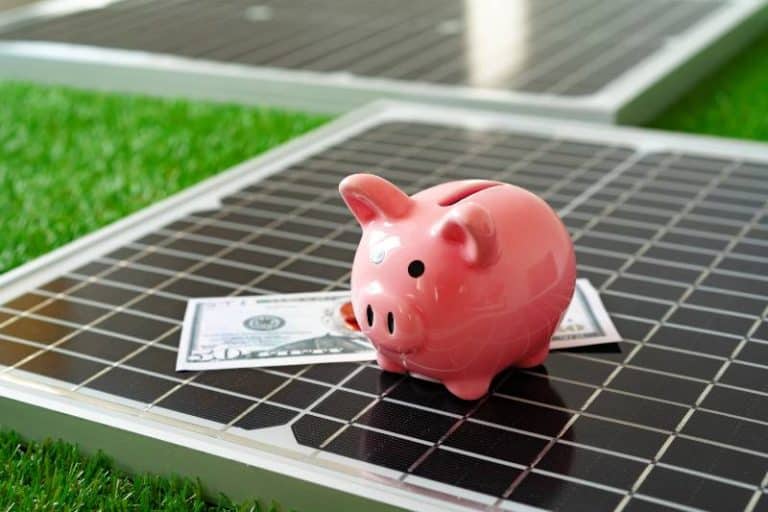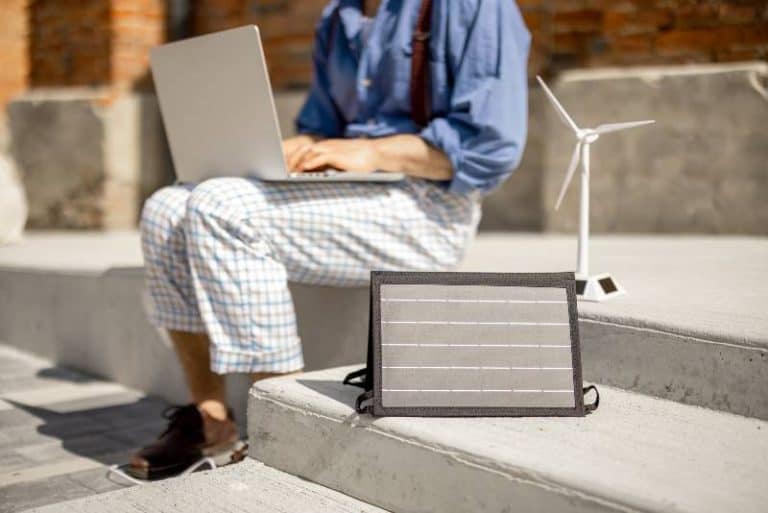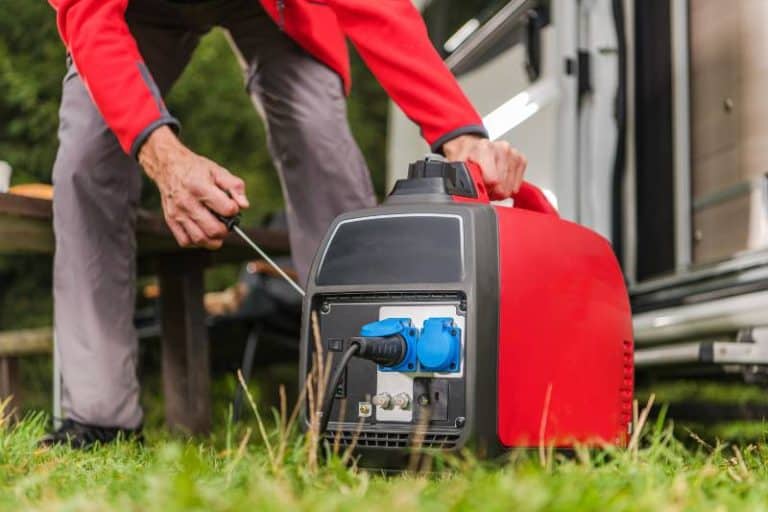Off-Grid Power: Top Portable Solar Panels for Camping Trips
The sun is an incredible source of energy, and although it can quickly take a toll on your finances if you’re powering your home with solar panels, there’s no better way to go green when out in nature. Camping trips provide the perfect opportunity to take advantage of the free energy from the sun by using portable solar panels! Portable solar panels are ideal for campers because they require minimal setup and maintenance, while still providing plenty of power during long days outdoors. In this article, we’ll look at some of the best portable solar panels on the market and what makes them stand out from other offerings. Read on to learn more about shopping for quality camping portable solar panel solutions!
When selecting a portable solar panel for camping, consider factors like size, weight, efficiency, and durability. Installation requires an optimal location with plenty of sunlight and correct positioning. Maintain your panel by keeping it clean, storing it properly, and avoiding extreme weather. Your choice should be dictated by your specific power requirements and camping conditions.
Key Takeaways
- Before purchasing a portable solar panel, it’s crucial to understand your specific needs. Factors such as size, weight, efficiency, output, price, and durability will vary between models. Assess your power requirements, the types of devices you’ll be charging, and the conditions you’ll be using the panel in to find the best fit for you.
- Proper installation and usage of portable solar panels are paramount for optimal performance. Choose a location with maximum sun exposure, position the panel correctly, and use appropriate cables and connectors.
- Like any piece of equipment, regular maintenance of your portable solar panel will ensure it remains efficient and prolongs its lifespan. This includes cleaning the panels regularly, storing them correctly when not in use, and protecting them from extreme weather conditions.
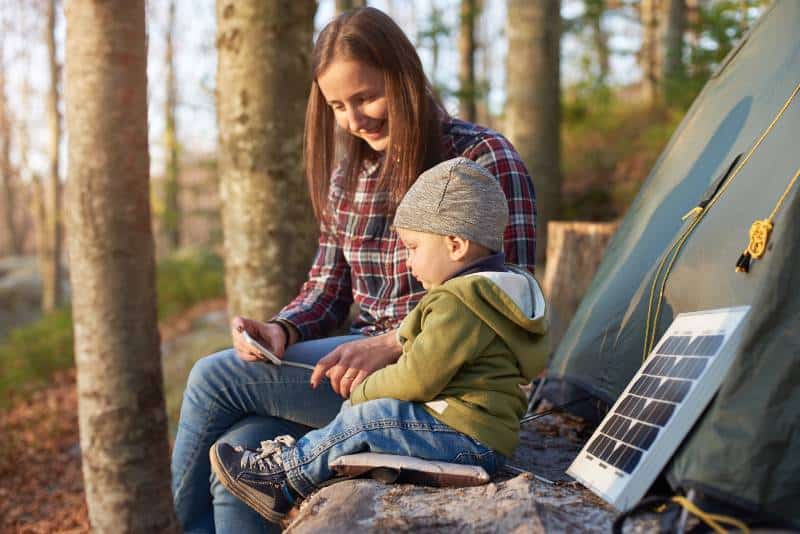
Understanding Portable Solar Panels
Portable solar panels are a compact, flexible, and mobile variant of traditional solar panels, designed to convert sunlight into usable electrical energy. They’re engineered for mobility, and easy installation, and provide an efficient power source for locations that might be far removed from the traditional electrical grid.
A solar panel, whether it’s standard or portable, harnesses the power of the sun by utilizing the photovoltaic effect. The term “photovoltaic” stems from the word “photo”, meaning light, and “voltaic”, relating to electricity.
This process involves the conversion of sunlight, or solar radiation, into direct current (DC) electricity. Within a solar panel, there are several solar cells made of semiconducting materials, commonly silicon, which when struck by sunlight, generate this electric current.
Now, let’s move on to the core differences between standard and portable solar panels:
- Size and Weight: Standard solar panels are usually larger and heavier due to the necessity to generate more electricity to power buildings or structures. Portable solar panels, on the other hand, are typically smaller and lighter to maintain their key aspect of portability. An analogy would be comparing a large stationary power generator to a smaller, portable one; both serve the same purpose, but their capacity and ease of movement differ significantly.
- Application: Standard solar panels are typically used in residential and commercial solar power systems, whereas portable solar panels are more commonly used for smaller, mobile applications like camping, RVs, or powering small devices when you’re off the grid. It’s like comparing a home kitchen to a camping stove. Both can cook your meals, but the former is built into a structure and has a larger capacity, while the latter is designed for mobility and smaller scale cooking.
- Installation: Standard solar panels are typically installed on rooftops or in large solar farms and require a professional for proper installation and setup. Portable solar panels, however, are designed for easy set-up and takedown, much like setting up a tent versus building a house.
- Cost: Generally, standard solar panels have a higher upfront cost as they are part of a larger system that includes inverters, batteries, and professional installation. Portable solar panels, on the other hand, are typically cheaper due to their smaller size and less complex installation requirements.
How Portable Solar Panels Work
Portable solar panels work much in the same way as their larger, stationary counterparts. They are made up of smaller photovoltaic cells that, when exposed to sunlight, generate an electric current. However, due to their smaller size, they typically generate less electricity.
Imagine a garden, where each plant represents a solar cell. A larger garden (standard solar panel) has more plants, so it can produce more fruit (electricity), while a smaller garden (portable solar panel) will produce less.
Once the portable solar panel has been exposed to sunlight and generated electricity, this electricity is typically stored in a connected battery or power bank for later use. This is somewhat similar to how a dam works. The water flowing into the dam (sunlight hitting the solar cells) is stored (electricity in the battery) and then released as needed to generate power.
It’s important to remember that the efficiency of a portable solar panel will also be influenced by the intensity and angle of the sunlight it receives. The brighter and more direct the sunlight, the more electricity the panel will generate. It’s a bit like adjusting the position of a sunflower to face the sun directly; the sunflower gets more sunlight and thus can grow better.
Factors to Consider When Choosing Portable Solar Panels
Choosing the right portable solar panel requires careful consideration of several factors. Just like picking the perfect car involves assessing things like fuel efficiency, price, size, and durability, the same careful scrutiny applies to solar panels. Here are some crucial factors to consider:
- Size and Weight: One of the most significant considerations for a portable solar panel is its size and weight. These two factors will largely determine its portability and ease of use. It’s much like choosing a suitcase for traveling; a larger, heavier suitcase may hold more, but it can be more cumbersome to move around. Conversely, a smaller, lighter suitcase is easier to carry, but it may not hold as much. In the case of solar panels, size, and weight can influence the amount of power the panel can produce and how easy it is to transport.
- Efficiency and Output: Efficiency refers to how well the solar panel can convert sunlight into usable electricity. Output, on the other hand, indicates the amount of electricity the panel can produce. These are like the miles-per-gallon rating and horsepower in a car. The higher the efficiency and output, the more power you’ll get from your panel. However, more efficient panels with higher output can be more expensive, so it’s essential to find a balance that suits your needs and budget.
- Price: The cost of the portable solar panel is a crucial consideration, just like the price tag on a new appliance or car. Higher-priced solar panels often come with more features or better performance, but they might not always be necessary for your specific needs. It’s important to balance cost with your energy requirements and the panel’s overall quality.
- Durability and Weather Resistance: Lastly, you need to consider the panel’s durability and its resistance to different weather conditions. A good portable solar panel should be able to withstand various elements, such as rain, dust, and harsh sunlight, much like an all-weather coat that can keep you dry and warm in different weather conditions. Pay close attention to the materials used and the build quality of the panel, as these factors can affect its lifespan and performance.
Top 5 Portable Solar Panels for Camping
Camping and solar power go hand-in-hand, as campers often need a reliable and environmentally friendly power source when they’re out in the wilderness. Here are five of the top portable solar panels that can be ideal for camping, complete with detailed reviews of their features, along with their pros and cons.
Goal Zero Nomad 20 Solar Panel
- Features: The Goal Zero Nomad 20 Solar Panel is a compact, foldable solar panel designed for charging devices directly from the sun. It features a built-in kickstand that adjusts to capture maximum sunlight and multiple output ports to connect and charge a variety of devices.
- Pros: It’s foldable design and lightweight nature make it extremely portable and easy to pack, much like a book that can be slipped into a backpack. The built-in kickstand is a nice addition that allows optimal positioning for maximum sun exposure.
- Cons: Despite its excellent portability, the Nomad 20 isn’t the most powerful solar panel on the market, so it may take longer to charge larger devices or power banks.
Anker PowerPort Solar Lite 21W
- Features: This solar charger offers fast charging with PowerIQ technology. It is incredibly durable and weather-resistant, thanks to its industrial-strength PET polymer-faced solar panels sewn into a rugged polyester canvas.
- Pros: The Anker PowerPort shines in terms of its combination of portability and power. Its ability to deliver 21W makes it more powerful than some larger, bulkier models, much like a compact, turbocharged car engine that can outperform larger ones.
- Cons: The lack of a built-in battery means that you’ll need an external power bank to store the energy it generates, which could be an additional cost if you don’t already own one.
BigBlue 28W Solar Charger
- Features: BigBlue’s Solar Charger is equipped with four solar panels and offers 28W power output. It features two USB ports for charging multiple devices and has a smart charging technology that adjusts the output to suit the connected device.
- Pros: The multiple panels and high output of the BigBlue Solar Charger make it akin to a four-burner stove; it can do more at once. Its smart charging technology also ensures efficient charging without overheating or overcharging.
- Cons: It’s slightly heavier and bulkier than some of its competitors, which could be a disadvantage for backpackers or those with limited space.
Jackery SolarSaga 60W Solar Panel
- Features: The SolarSaga is a higher-capacity solar panel offering a power output of 60W. It features two USB ports and is designed to work optimally with Jackery’s own range of portable power stations.
- Pros: The high power output means faster charging times, so it’s ideal for those needing to power larger devices or multiple small devices. It’s like a high-capacity water jug; it can serve more people without needing to be refilled as often.
- Cons: The larger size and higher capacity come with a higher price tag. Also, while it can charge other devices, it’s specially designed for Jackery power stations, so compatibility with non-Jackery devices might not be as seamless.
Renogy E.FLEX 10W Mini Portable Solar Panel
- Features: This is a mini portable solar panel with a power output of 10W. It includes suction cups for easy attachment to windshields or windows and a carabiner to hook onto a backpack.
- Pros: Its compact size and innovative attachment options make it an excellent choice for solo campers or hikers who need to charge a phone or GPS device on the go. It’s like a small pocket knife; it’s not the biggest tool, but it’s very handy and easy to carry around.
- Cons: With a 10W output, it’s not suitable for charging larger devices or multiple devices at once. It also lacks a built-in battery for energy storage, so you’ll need an external power bank.
When choosing a portable solar panel for camping, you’ll need to balance factors like size, power output, price, and how well it suits your specific camping needs. Remember that the best solar panel for you is one that fits your camping lifestyle and power needs the best.
How to Install and Use Portable Solar Panels While Camping
Installing and using portable solar panels while camping can be a fairly straightforward process, but there are a few essential steps and safety tips to keep in mind.
Installation Process
- Choose an Optimal Location: Much like choosing a good spot for a sunbathing session, find a location that will get plenty of sunlight throughout the day. Avoid areas with significant shade from trees or other obstacles.
- Set Up the Panel: Portable solar panels usually come in a few different forms, but the most common ones are foldable or suitcase-style. These types can be easily spread out or propped up. Some panels include a built-in stand (like the back of a picture frame), but if not, you can lean it against your backpack, a rock, or any stable surface.
- Position the Panel: Aim the panel directly towards the sun for maximum efficiency. Remember, the sun moves throughout the day, so you might have to adjust the position of the panel a few times to keep it facing the sun.
- Connect Your Devices or Power Bank: Use the appropriate cables to connect your device or power bank to the solar panel. Many panels have USB ports, but others may require specific connectors. It’s like plugging your phone charger into a wall outlet – make sure you have the right cable for the device you’re charging.
Maintenance and Safety Tips
- Keep the Panels Clean: Regularly clean your solar panel with a soft, damp cloth to remove dust or dirt. This is important because dirt can block sunlight and reduce the efficiency of the panel, just like how dust on a window can block sunlight from coming into a room.
- Avoid Extreme Weather: Although many portable solar panels are weather-resistant, they are not indestructible. Avoid exposing them to extreme weather conditions such as heavy rain, hail, or strong winds. Treat them like you would your electronic devices.
- Store Properly: When not in use, store the solar panels properly. Keep them in a protective case if provided, or a safe place where they will not be damaged or exposed to adverse conditions.
- Use the Right Cables and Connectors: Always use the cables and connectors that come with the solar panel or those specified by the manufacturer. This is to ensure the safety and efficiency of your panel.
- Avoid Overloading: Do not try to power too many devices at once or devices that require more power than the panel can produce. It’s like trying to fill multiple large buckets with a small hose – the water (or in this case, power) just won’t be enough.
- Cool Down Period: If the solar panel becomes too hot due to intense sunlight, give it a break and allow it to cool down. Overheating can reduce the efficiency and lifespan of the solar panel.
With the proper setup, usage, and maintenance, a portable solar panel can be a fantastic addition to your camping gear, providing you with a reliable and renewable source of power, no matter where your adventures take you.
You might want to check out this helpful article titled “How to Improve Your Road Trips With Portable Solar Panels“. It offers valuable insights and tips on how to harness the power of solar panels to improve your road trips and make them more sustainable. The article covers topics such as the benefits of using portable solar panels, how to choose the right panels for your needs and tips for installation and maintenance. Give it a read and make your next road trip an eco-friendly and memorable one!
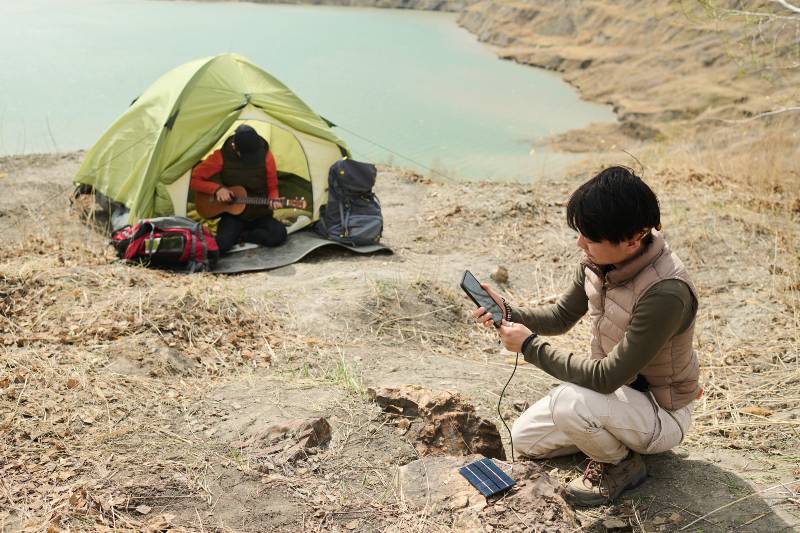
The Best Portable Solar Panels for Camping FAQs
Can you suggest some top-rated portable solar panels for camping?
Yes, the top-rated portable solar panels for camping include the Nekteck 21W Solar Panel, the Jackery SolarSaga 60W Solar Panel, and the Renogy E.FLEX 10W Mini Portable Solar Panel.
How do I install a portable solar panel when I’m camping?
Installing a portable solar panel when camping is fairly straightforward. Begin by finding an optimal location that gets plenty of sunlight throughout the day, then set up the panel and aim it directly towards the sun. Next, connect your device or power bank to the solar panel using the appropriate cables and connectors.
How do I maintain my portable solar panel?
Regular maintenance of your portable solar panel is essential for optimal performance. Start by keeping the panel clean with a soft, damp cloth to remove dust or dirt. Then, avoid exposing it to extreme weather conditions like heavy rain and strong winds, and store it in a protective case when not in use.
Are portable solar panels weather resistant?
Most portable solar panels are weather-resistant, but they may not be indestructible. It’s best to avoid exposing them to extreme weather conditions and treat them like you would your electronic devices. Additionally, always use the cables and connectors that come with the solar panel or those specified by the manufacturer for optimal performance and safety.
How efficient are portable solar panels compared to standard ones?
Portable solar panels tend to be less efficient than standard solar panels due to their smaller size and lower wattage output. However, they are still a great choice for camping and other outdoor activities when you need a reliable source of power without having to rely on an outlet or a solar generator.
Conclusion
One thing is clear: the best solar panels for camping depend on what type of usage you require. Consider your needs and research options depending on size, weight, output, and other factors. Responsible buying ensures that you get the most use out of your solar panel — especially considering it’ll be in the direct sun while in use outdoors! It’s also essential to ensure that your devices are compatible with your chosen panels, to make sure your energy is utilized efficiently and successfully. Lastly, don’t forget to sign up for Electrik Living’s newsletter so you can stay informed about the latest discoveries and breakthroughs in solar power technology — it could make all the difference in helping you choose just the right portable solar panel for camping!


